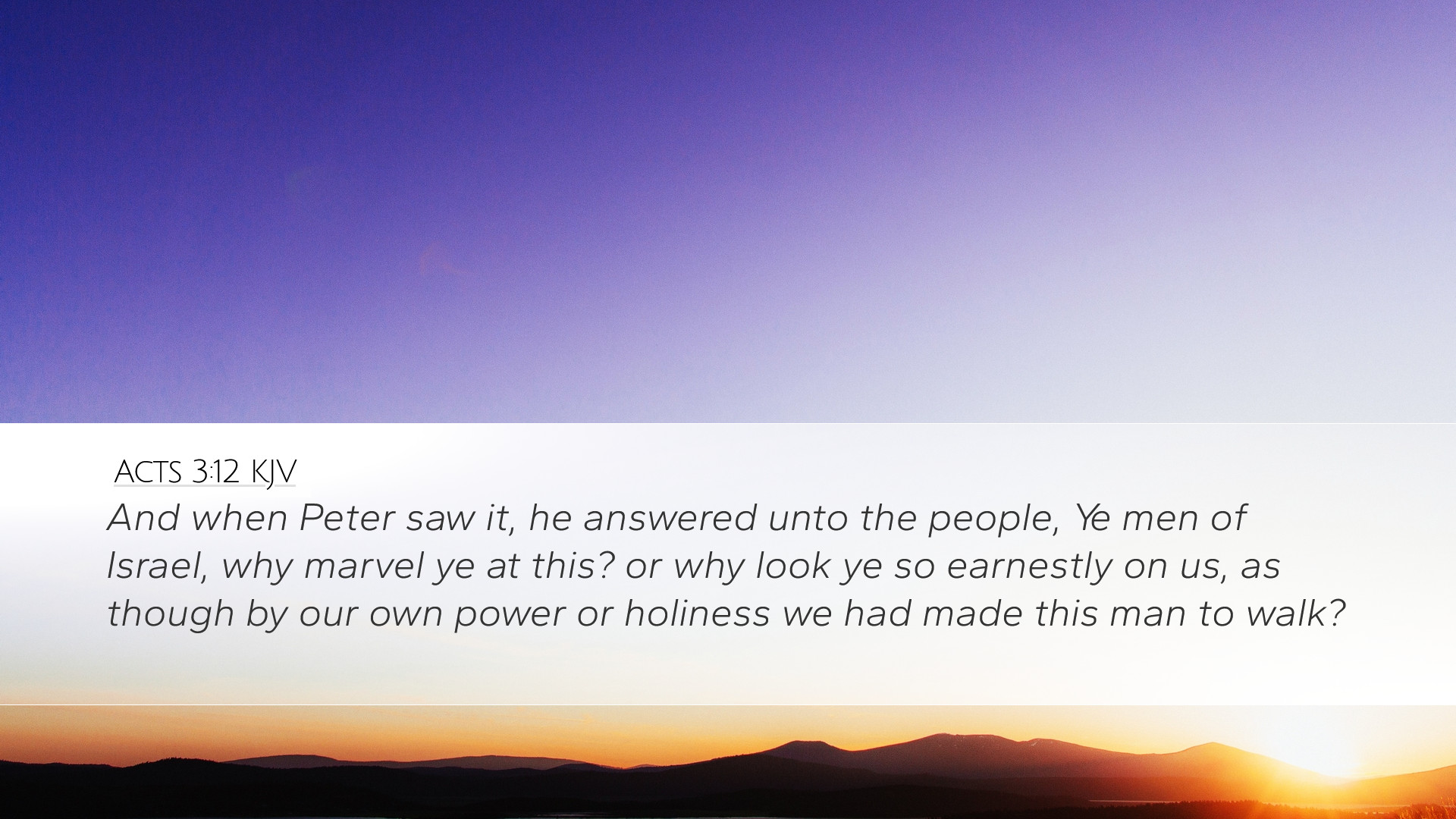Old Testament
Genesis Exodus Leviticus Numbers Deuteronomy Joshua Judges Ruth 1 Samuel 2 Samuel 1 Kings 2 Kings 1 Chronicles 2 Chronicles Ezra Nehemiah Esther Job Psalms Proverbs Ecclesiastes Song of Solomon Isaiah Jeremiah Lamentations Ezekiel Daniel Hosea Joel Amos Obadiah Jonah Micah Nahum Habakkuk Zephaniah Haggai Zechariah MalachiActs 3:12
Acts 3:12 KJV
And when Peter saw it, he answered unto the people, Ye men of Israel, why marvel ye at this? or why look ye so earnestly on us, as though by our own power or holiness we had made this man to walk?
Acts 3:12 Bible Commentary
Commentary on Acts 3:12
Acts 3:12 states, "When Peter saw this, he said to them: 'Men of Israel, why do you marvel at this? Or why do you look so intently at us, as though by our own power or godliness we had made this man walk?'"
Introduction
This verse takes place in the context of a miraculous healing performed by the Apostle Peter at the Temple. This event raises important theological insights and practical applications for believers. Peter's response underscores the source of power and the correct attitude toward miracles in the Christian faith.
Peters's Address to the People
Peter's words indicate that the marvel of the healed man should not be attributed to any human capability. As Matthew Henry explains, Peter seeks to redirect the amazement of the people from themselves to God, who is the ultimate source of all power and miracles.
- Human Nature's Tendency: The human inclination is to elevate leaders and figures of authority, sometimes attributing divine power to them. This can lead to idolization, as noted by Albert Barnes.
- Emphasis on God's Agency: Peter emphasizes that the miracle is an act of God. It is not by their own merit that they have performed such a work but by divine authority, which is a central theme in biblical miracles.
Theological Implications
This verse invites reflection on several theological principles:
- Divine Sovereignty: The miracle performed is a testimony to God's power and sovereignty in the world, asserting that He is actively involved in human affairs.
- Role of Faith: As Adam Clarke points out, faith is imperative for understanding miracles. The healed man, along with the onlookers, encounter faith in action, which demonstrates that faith is integral to the work of God.
- Human Humility: Paul’s epistles often call for humility among leaders, echoing Peter’s sentiment here. The work of God should lead to reverence and not pride among His servants.
Responses to Miracles
The crowd's reaction, as highlighted by various commentaries, shows a mix of amazement, disbelief, and curiosity. Peter's response serves as a model for addressing such reactions:
- Clarification: Peter does not shy away from the miracle; instead, he clarifies its source, bringing the focus back to God’s power.
- Call to Repentance: Following this verse, the call for the people to repent and turn to Christ is central to Peter's message, indicating that miracles should lead to deeper spiritual truths.
Applications for Believers
For pastors, students, theologians, and Bible scholars, Acts 3:12 is rich with applications:
- Ministry Motivation: Those in ministry should be motivated by humility and the desire to manifest God's power rather than seeking personal glory.
- Understanding Miracles: Modern believers can learn that miracles are signs pointing to God’s sovereign action, and they should not distract from the message of the Gospel.
- Engaging with Doubt: Just as the crowd was amazed but confused, contemporary believers should be equipped to engage with doubt, offering God-centered explanations.
Conclusion
Acts 3:12 not only recounts a remarkable event but also serves as a theological teaching moment about the nature of divine power and human responsibility. It calls believers to recognize God's hand in their lives and move beyond surface-level signs to deeper faith. As we reflect on this verse, may we continually seek to point others not to ourselves, but to the magnificent works of God through Christ.


